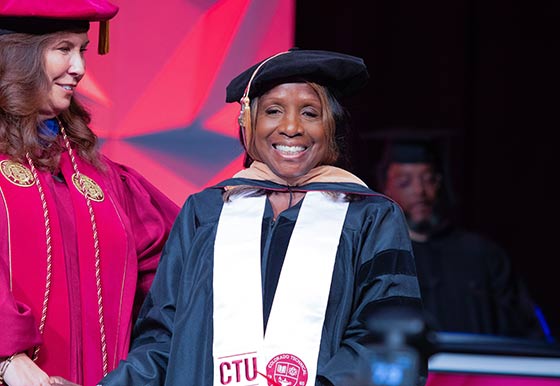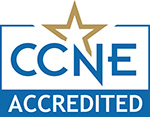Convenient Online Doctorate Degree Programs
At Colorado Technical University, you could pursue a doctorate in one of our fully online doctoral programs that make it possible to take your education to the next level without putting your life on hold. Our online doctorate courses are designed to be rigorous and challenging, but with our proprietary online tools and a mentor who can provide support and guidance as you move through the program, it’s possible to complete your doctorate degree in three years or less. We offer 9 online doctorate degree program options spanning fields in computer science, management, and nursing.
Find Your Program
Filter
-
- Doctorate of Computer Science
- Computer Science
- Online
-
- Doctorate of Computer Science
- Computer Science - Big Data Analytics
- Online
-
- Doctorate of Computer Science
- Computer Science - Cybersecurity and Information Assurance
- Online
-
- Doctorate of Management
- Management
- Online
-
- Doctorate of Management
- Management - Executive Leadership
- Online
-
- Doctorate of Management
- Management - Healthcare Management and Leadership
- Online
-
- Doctorate of Management
- Management - Homeland Security
- Online
-
- Doctorate of Management
- Management - Organizational Development and Change
- Online
-
- Doctorate of Nursing Practice
- Nursing Practice
- Online
Benefits of CTU’s Online Doctoral Programs
At CTU, you’re empowered to take charge of your education, but you’re never alone. Our flexible doctorate courses may be able to provide you with the freedom you need to focus on your current obligations and academic goals. And, as you pursue your chosen doctorate degree online, you’ll have the support of CTU faculty and staff as well as opportunities to forge relationships with advisors and fellow classmates, all of whom could become part of an important network you may have not just while in school, but long after graduation.
Doctoral Library
Our online doctoral library provides 24/7 access to approved research materials, including research journals, magazines, conference proceedings, books, theses, videos, and more
Intellipath® Learning
Our intellipath® learning tool can help identify what you already know and anticipate what you’re ready to learn, letting you focus on something new1
CTU Mobile
With CTU Mobile and CTU’s Virtual Classroom, you can access course assignments, use our extensive online library, listen to live chats, read discussion boards, track your grades, and more, whenever and wherever you have an Internet connection
1 intellipath® is not available for all courses
Request Information
Select your campus to get startedEstimate Your Costs, Potential Savings and Graduation Date
Online Doctorate Admissions Overview
All prospective CTU students must complete an interview with an Admissions Advisor and submit a completed application, but there is no GRE requirement for any of CTU’s online doctorate degree programs. All applicants must have earned a minimum 3.0 GPA on a 4.0 GPA scale in their master’s program. For Doctor of Management and Doctor of Computer Science programs, applicants must submit official transcripts that verify completion of an accredited master’s degree in a discipline related to the CTU doctoral program to which they are applying. Applicants must also submit a resume containing at least five years of work experience and an essay. (See the University Catalog for complete details.)
For the Doctor of Nursing Practice program, applicants must submit official transcripts that verify completion of an accredited Master of Science in Nursing program; proof of an active, clear, and unencumbered RN license; and an Attestation of Supervised Clinical/Practice/Practicum form that verifies completion of a minimum of 120 clinical hours at the post-baccalaureate level. Please see the Specialized Admission and Graduation Requirements section of the University Catalog for further details.

Spend Less Time And Money On Your Degree Program
Transfer-In Credits
Qualifying students may be eligible to transfer-in up to 75% of the program credits required to complete their doctorate degree program2
Military Experience
Military education benefits could help cover the cost of doctorate courses and textbooks for those who qualify
Doctoral Advantage
Students enrolled in our master’s programs may be able to substitute up to two doctoral courses for two master’s courses, helping them complete their online doctorate up to 10 weeks faster
Non-Collegiate Experience
CTU may award proficiency credit for experiential learning gained through employment or other applicable, non-collegiate learning experiences2

Doctorates in computer science and management are typically earned in three years at CTU, while the doctor of nursing practice is typically completed in 21–27 months. However, because you only need to complete 25 percent of your program’s credit-hour requirements at CTU (we accept eligible transfer credits up to 75 percent of the required credits toward your degree),2 it’s possible to complete your online doctorate degree faster than you might at first think.
2 Transfer credit is evaluated on an individual basis. Not all credits are eligible to transfer. See the University Catalog for transfer credit policies.
Accreditation
Colorado Technical University is institutionally accredited by the Higher Learning Commission (www.hlcommission.org). Our business degree programs are accredited by the Accreditation Council for Business Schools and Programs (ACBSP), and Doctor of Nursing Practice degree program at CTU is accredited by the Commission on Collegiate Nursing Education, 655 K Street NW, Suite 750, Washington, DC 20001, 202-887-6791.


Online Doctorate Degree Programs
Online doctorate degree programs at CTU are designed to be challenging and enriching. That’s why, in addition to rigorous online coursework, students must demonstrate satisfactory completion of a research proposal, and satisfactory completion and presentation of a dissertation or special project (depending upon program). All doctoral students are further required to attend two, two-and-a-half day symposium events that are held virtually or in Colorado Springs, Colorado. These symposia provide our doctorate degree students with valuable opportunities to meet and network with faculty, peers, and special guest-speakers, and serve to enhance the academic experience overall. Our online doctoral programs include:
Doctor of Computer Science
CTU’s online doctoral program in computer science focuses on topics in both computer science and information systems, as well as an orientation to research and writing at the doctoral level. In the Doctor of Computer Science program, students can explore high-level design issues; evaluate methods of maintaining security in distributed systems; develop a software process improvement plan for an organization and design; and test, implement, and report on the results of an experiment. Core courses include current topics in computer science and IT, qualitative and quantitative research methods, research methods and design, and structured courses for your dissertation. The doctorate in computer science is offered as a general track option, or you could choose from concentrations in big data analytics and cybersecurity and information assurance.
Doctor of Management
Colorado Technical University’s Doctor of Management program is designed for management professionals and is offered in four concentrations and a general track. This online doctoral program provides an opportunity for students to enhance their strategic-thinking skills and existing management capabilities with the aim of developing a more robust leadership style suited to taking on higher levels of responsibility in their fields. Core courses include management theory, ethics, application of action research, strategic thinking and organizational alignment, practice and theory of consulting and intervention, leadership theory and development, qualitative and quantitative research methods, and structured courses on the creation and completion of your dissertation.
Doctor of Nursing Practice
Our Doctor of Nursing Practice program is designed for licensed Registered Nurses (RNs) who already possess a Master of Science in Nursing, and who want to better prepare themselves to take on more advanced leadership and administrative roles in the field and work to improve healthcare outcomes through evidence-based processes. Our focused, online doctorate degree program offers the opportunity to earn a degree in 21–27 months,3 without having to press pause on your life. We utilized the American Association of Colleges of Nursing’s The Essentials of Doctoral Education for Advanced Nursing Practice (2006) to develop our comprehensive, practice-focused online doctoral program (https://www.aacnnursing.org/Portals/42/Publications/DNPEssentials.pdf), which provides coverage of topics such as healthcare delivery systems, health economics and finance, health policy, research methods, translation of evidence into practice, concepts in population health, and nursing leadership.
3 This doctoral degree program can be completed in 21–27 months, depending on the number of clinical hours that need to be completed; however, many factors will impact your time to completion, including course loads, proficiency and/or, transfer credits and breaks.
What Students Are Saying About Their CTU Experience
[CTU's] commitment to practical, real-world learning and its ability to accommodate working professionals made it the ideal choice for my ongoing academic journey.
Tiffiny B. 2025 Graduate, Doctor of Management
I have obtained all 4 of my degrees from CTU. I found the programs to be consistent and easy to follow, which was an important factor when beginning my educational journey.
Dr. Parker. 2023 Graduate, Doctor of Management
My doctorate from CTU provides credibility in a professional setting while also displaying my ability to complete what I start. I plan on utilizing my degree in academia, non-profit, and government communities.
Dr. Arnold, Sr. 2023 Graduate, Doctor of Management
